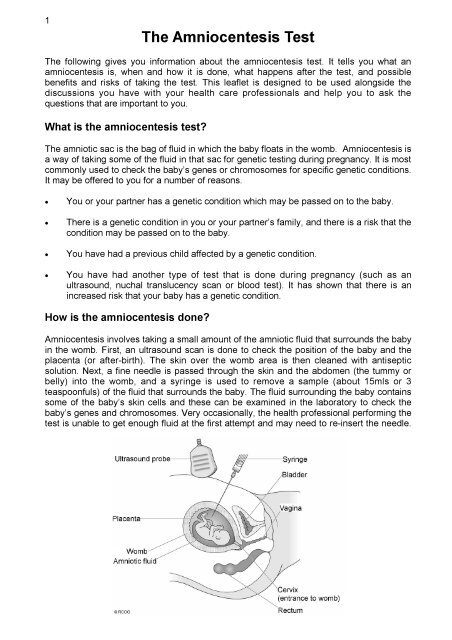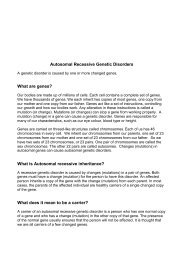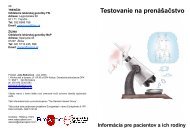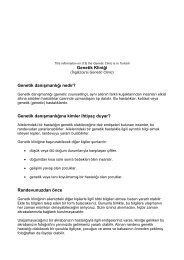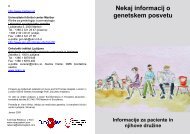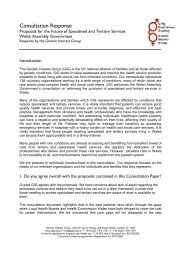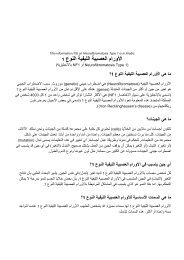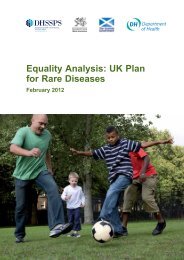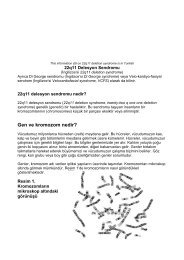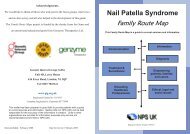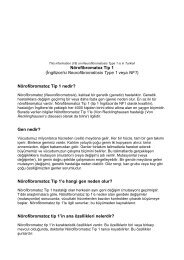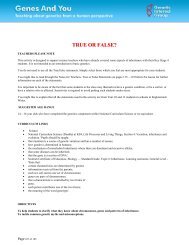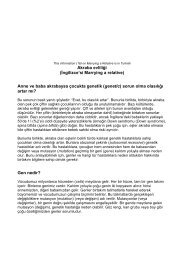The Amniocentesis Test - Genetic Alliance UK
The Amniocentesis Test - Genetic Alliance UK
The Amniocentesis Test - Genetic Alliance UK
Create successful ePaper yourself
Turn your PDF publications into a flip-book with our unique Google optimized e-Paper software.
1<br />
<strong>The</strong> <strong>Amniocentesis</strong> <strong>Test</strong><br />
<strong>The</strong> following gives you information about the amniocentesis test. It tells you what an<br />
amniocentesis is, when and how it is done, what happens after the test, and possible<br />
benefits and risks of taking the test. This leaflet is designed to be used alongside the<br />
discussions you have with your health care professionals and help you to ask the<br />
questions that are important to you.<br />
What is the amniocentesis test?<br />
<strong>The</strong> amniotic sac is the bag of fluid in which the baby floats in the womb. <strong>Amniocentesis</strong> is<br />
a way of taking some of the fluid in that sac for genetic testing during pregnancy. It is most<br />
commonly used to check the baby’s genes or chromosomes for specific genetic conditions.<br />
It may be offered to you for a number of reasons.<br />
• You or your partner has a genetic condition which may be passed on to the baby.<br />
• <strong>The</strong>re is a genetic condition in you or your partner’s family, and there is a risk that the<br />
condition may be passed on to the baby.<br />
• You have had a previous child affected by a genetic condition.<br />
• You have had another type of test that is done during pregnancy (such as an<br />
ultrasound, nuchal translucency scan or blood test). It has shown that there is an<br />
increased risk that your baby has a genetic condition.<br />
How is the amniocentesis done?<br />
<strong>Amniocentesis</strong> involves taking a small amount of the amniotic fluid that surrounds the baby<br />
in the womb. First, an ultrasound scan is done to check the position of the baby and the<br />
placenta (or after-birth). <strong>The</strong> skin over the womb area is then cleaned with antiseptic<br />
solution. Next, a fine needle is passed through the skin and the abdomen (the tummy or<br />
belly) into the womb, and a syringe is used to remove a sample (about 15mls or 3<br />
teaspoonfuls) of the fluid that surrounds the baby. <strong>The</strong> fluid surrounding the baby contains<br />
some of the baby’s skin cells and these can be examined in the laboratory to check the<br />
baby’s genes and chromosomes. Very occasionally, the health professional performing the<br />
test is unable to get enough fluid at the first attempt and may need to re-insert the needle.
2<br />
When is the amniocentesis done?<br />
<strong>Amniocentesis</strong> is usually done after 15 weeks of pregnancy.<br />
Is the amniocentesis painful?<br />
Most women consider amniocentesis to be uncomfortable but not really painful. It is<br />
usually over in a few minutes. Some women get a tightening feeling in the womb<br />
afterwards, or may feel a little soreness for one day. This is not unusual.<br />
What will happen after the amniocentesis?<br />
<strong>The</strong> test itself should only take a few minutes. It is a good idea to bring a companion with<br />
you for support both during and after the test. You should take things easy for a couple of<br />
days after the test. Avoid any heavy lifting or strenuous exercise. If you have abdominal<br />
discomfort which lasts longer than 24 hours, or if you have fever, or if you have any<br />
unusual vaginal discharge or vaginal bleeding, you should let your doctor know.<br />
What are the risks of the amniocentesis?<br />
Up to 1 woman in 100 (1%) will have a miscarriage as a result of having an<br />
amniocentesis. We do not really know why this happens. However 99 out of 100<br />
pregnancies (99%) should continue normally. Other than this, there is no evidence that<br />
amniocentesis is harmful to your baby.<br />
Is the amniocentesis reliable?<br />
You should discuss with the doctor the accuracy of the particular genetic test that you are<br />
considering, as this will differ depending on the type of change in the genes or<br />
chromosomes for which the test is being done.<br />
Occasionally (1 in 100 samples) there are not enough cells obtained from the<br />
amniocentesis for the test to be done on that sample. When this happens, it is usually<br />
obvious in the laboratory about 7 to 10 days after the amniocentesis. If this happens, you<br />
will be notified and offered another test.<br />
Can all genetic problems be detected with the amniocentesis?<br />
<strong>Test</strong> results usually only provide information about the condition that was tested for.<br />
Occasionally the test may uncover results relating to other conditions. <strong>The</strong>re is no general<br />
test for all genetic conditions.<br />
How long will it take to get the results of the amniocentesis?<br />
<strong>The</strong> time it takes to receive the results depends on which condition is being tested for. For<br />
some conditions it will only take 3 days to get the test results. For others it will take 2-3<br />
weeks. If the result takes longer than this, it does not necessarily mean that something<br />
unusual has been found, it may mean that the cells are taking a longer time to grow.<br />
If you are having an amniocentesis for a rare genetic condition, ask the doctor how long it<br />
will take to get the results back.<br />
When the test results are ready you may be called back to speak to the doctor or health
3<br />
professional, or you may be given the results another way, such as by telephone. You<br />
should discuss this with the doctor at the time of the test.<br />
What if the result shows the baby has a genetic condition?<br />
If the result shows the baby has a genetic condition, the doctor will discuss what this<br />
means and how this could affect your baby. <strong>The</strong>y will discuss with you if there is a cure or<br />
treatment available. <strong>The</strong>y will talk about your options and sometimes the possibility of<br />
ending the pregnancy. <strong>The</strong>y will help you consider what is best for you and the baby.<br />
Very occasionally the test will uncover an unusual chromosome arrangement where the<br />
impact on the baby will be unclear.<br />
HIV infection<br />
If you are HIV positive, there is a small risk that the amniocentesis might cause the HIV<br />
virus to be passed on to your baby. It is important therefore that if you are HIV positive<br />
you discuss this with your midwife or doctor as measures need to be taken to minimise<br />
the risk of transmission to your baby during the amniocentesis.<br />
Making a decision about the amniocentesis<br />
Making a decision about having an amniocentesis test during pregnancy can be difficult.<br />
It is important to remember that you do not have to take the amniocentesis test if you do<br />
not want to. You should only have an amniocentesis if you and your partner feel that it is<br />
important for you to have the information which the test can provide, and do not feel the<br />
risks are too great for you to take.<br />
To help you make the decision which is best for you, you should discuss the following<br />
information with your doctor:<br />
• Information about the condition being tested for.<br />
• <strong>The</strong> risk that the baby has the genetic condition you are thinking of testing for.<br />
• Information about the test and what the results will tell you.<br />
• <strong>The</strong> reliability of the test.<br />
• <strong>The</strong> risk of having an uncertain result and having to take the test again.<br />
• <strong>The</strong> risk of miscarriage.<br />
• How long it will take to get the test results.<br />
• How you will get the test results.<br />
• Your options if the baby is found to have a genetic condition.<br />
• How the experience may affect you and your partner emotionally.<br />
<strong>The</strong>se are some of the issues you should think about before making a decision about the<br />
amniocentesis test. You can also look at the ‘Frequently Asked Questions’ leaflet, which<br />
lists a number of questions you might want to ask the doctor about genetic testing. It has<br />
been developed by people who have been through a similar experience to your own.
4<br />
Bring any questions or concerns with you to your appointment – write them down. If you<br />
need an interpreter, let the department know.<br />
This is only a brief guide to the amniocentesis test. More information can be obtained<br />
from your local regional genetics centre (www.gig.org.uk/services.htm) or from these<br />
addresses:<br />
Antenatal Results and Choices<br />
(ARC)<br />
73 Charlotte St.,<br />
London,<br />
W1T 4PN<br />
Tel: 020 7631 0285<br />
Providing support and<br />
information for women during the<br />
antenatal testing process.<br />
Email: info@arc-uk.org<br />
Web: www.arc-uk.org<br />
Unique - <strong>The</strong> Rare Chromosome<br />
Disorder Support Group<br />
PO Box 2189,<br />
Caterham,<br />
Surrey<br />
CR3 5GN<br />
Telephone: 01883 330766<br />
Email: info@rarechromo.org<br />
Web:www.rarechromo.org<br />
<strong>The</strong> <strong>Genetic</strong> Interest Group<br />
Unit 4D, Leroy House,<br />
436 Essex Rd.,<br />
London, N1 3QP<br />
Telephone: 0207704 3141<br />
Provides information about<br />
specific genetic conditions and contact<br />
details of support<br />
organisations.<br />
Email: mail@gig.org.uk<br />
Web: www.gig.org.uk<br />
EuroGentest<br />
Free-access website providing<br />
information about genetic<br />
testing and links to support<br />
groups across Europe.<br />
Web: www.eurogentest.org<br />
Orphanet<br />
Free-access website providing<br />
information on rare diseases and<br />
orphan drugs, and links to support<br />
groups across Europe.<br />
Web: www.orpha.net<br />
Modified from leaflets produced by Guy’s and St Thomas’ Hospital, London; the Royal<br />
College of Obstetricians and Gynaecologists www.rcog.org.uk/index.asp?PageID=625<br />
and London IDEAS <strong>Genetic</strong> Knowledge Park according to their quality standards.<br />
January 2007<br />
This work was supported by EuroGentest, an EU-FP6 supported NoE contract number<br />
512148


